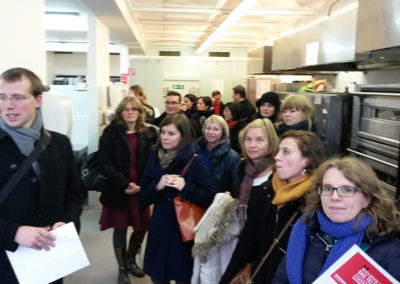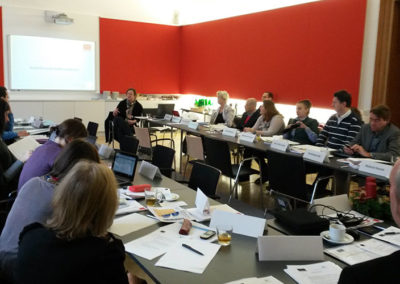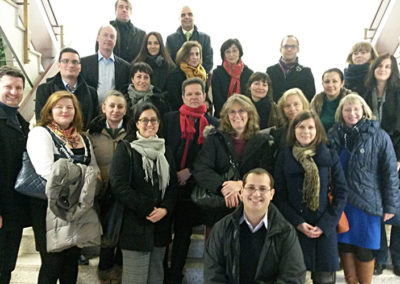In this moment of transition between the 2007-2013 and the 2014-2020 ESI Funds programming periods, EURoma Network held its second bi-annual meeting on 27th-28th November in Vienna, hosted by the Austrian partners.
The EURoma Network held its second bi-annual meeting on 27th-28th November in Vienna, hosted by the Austrian partners. In this moment of transition between the 2007-2013 and the 2014-2020 European Structural and Investment (ESI) Funds programming periods, and mainly at this particular moment when the negotiations on the use of ESI Funds for the next 10 years are about to close, the meeting primarily focused on two topics:
- How countries are incorporating Roma inclusion in the in the 2014-2020 ESI Funds programming period, both in the Partnership Agreements (PAs), which are now all concluded, and the Operational Programmes (OPs), which are in the final phases of negotiation.
- How Roma youth can benefit from youth employment initiatives at national level.
The meeting gathered representatives from 10 countries, including representatives of the ESF Managing Authorities and the public bodies in charge of Roma policies from the countries involved in the Network and Austria, as well as representatives of the European Commission’s DG Employment, Social Affairs and Inclusion, in addition to the EURoma Technical Secretariat (held by the Fundación Secretariado Gitano). The meeting also counted on the participation of representatives from national youth employment initiatives targeting specifically Roma or more generally socially excluded groups in Austria, Romania, Spain and Sweden (see meeting’s agenda and list of participants).
Welcoming and introductory words
Mr. Roland Hanak, Head of Staff Position Bilateral Cooperation in Labour Market Policy of the Austrian Federal Ministry of Labour, Social Affairs and Consumer Protection was in charge of opening the meeting and welcoming participants.
Following the welcoming words, Ms. Carolina Fernández of the EURoma Technical Secretariat, briefly presented the meeting’s agenda and the main topics to be discussed. She also thanked Austrian partners for hosting the meeting.
2014-2020 Structural and Investment Funds programming period: content of Partnership Agreements (PAs) and Operational Programmes (OPs)
Two of the sessions of the meeting focused on the advances since the last EURoma meeting, held in June in Rome, as regards the negotiations of the Partnership Agreements (PAs) and Operational Programmes (OPs) as well as how countries have incorporated, or are planning to incorporate, Roma inclusion in them.
Ms. Annette Björnsson, of the Unit in charge of coordination of ESF and Fund for European Aid to the Most Deprived (FEAD) of the European Commission (DG Employment, Social Affairs and Inclusion), informed participants that all PAs have already been adopted, while the negotiations of the OPs are still ongoing. Ms. Björnsson provided participants with an overview about how Roma inclusion is being taken into account in the PAs and OPs.
As regards the PAs, in general terms, Roma appear more prominently in the PAs of the countries with Country-Specific Recommendations (CSRs) related to Roma. But other countries also address Roma inclusion in the PAs (in some cases as part of vulnerable groups) and, in other cases, even if there is no mention in the PA, actions may be foreseen in the OPs.
As regards the OPs, in the countries with Roma CSRs, Roma inclusion is considered in relation to areas such as education, health and social services, (social) entrepreneurship and the role of public services to increase employability. In the other countries, areas include the employability of Roma people, entrepreneurship, language training, social housing, and the fight against discrimination and stereotypes. Particular attention is also paid to the problems of Roma women.
Following this general overview, Member States representatives shared information on the specific situation in their countries. In particular they reviewed:
- The state-of-play of negotiation and approval process of the PAs and OPs
- The changes related to Roma inclusion introduced/requested during negotiation process
- How is Roma inclusion incorporated in PAs: whether there is any specific mention to Roma inclusion (in which areas/priorities and funds) or if this is not the case, how is it foreseen that general measures reach the Roma?
- How is Roma inclusion being incorporated in OPs: whether any OP (either statewide or regional) foresees target measures for Roma inclusion or, if this is not the case, whether Roma is explicitly mentioned in other OPs.
- How has the partnership principle been implemented in the PAs and OPs, in particular how has been the level of involvement of the target population in the PA and OP drafting process and what is the expected involvement in implementation, monitoring and evaluation of the OPs.
Main EU mechanisms to tackle youth unemployment and the contribution of ESI Funds
The second topic addressed at the meeting was how Roma can benefit from youth employment initiatives at national level. This is a crucial issue given the relevance of youth employment for the Roma, a population significantly younger than the overall population and experiencing higher unemployment rates than the rest of society.
This section of the meeting was divided in two parts. Participants first reviewed if Roma youngsters are somehow considered in the Plans and OPs that Member States are adopting to implement the European Youth Guarantee at national level. This new tool offers Member States an opportunity to promote Roma youth employment and address the main challenges that make it difficult for Roma youngsters to have access to the labour market.
Afterwards, a number of national youth employment initiatives targeting socially excluded groups in general or Roma in particular were presented and analysed.
The session on national experiences started with the presentation of the Austrian approach on youth employment initiatives by Ms. Valerie Bösch, expert on Youth Guarantee of the Department of International Affairs in Labour Market Policy. Ms. Bösch first provided an overview of the main facts and figures and then presented the system for vocational and education training and the labour market policy for young people in Austria, focusing on the measures related to youth guarantee.
Initiatives from four different countries (Austria, Romania, Spain and Sweden) were then presented with the aim of analysing the key elements to ensure that youth employment initiatives do reach socially excluded groups, including Roma.
Mr. Christoph Trauner presented the Spacelab initiative in Vienna (Austria). Implemented by five NGOs, it is one of the projects of Vienna‘s Vocational Training Guarantee. It offers a complete and manifold programme aimed at the integration into the labour market of youngsters from 15 to 25 years, who are neither in education, employment nor training (NEETs) and have a more difficult access to the market. It is characterised by its modular approach combining methods of open youth work with vocational training, taking into account on the one hand the specific needs and circumstances of the target group and on the other hand the labour market context.
Mr. Rosario Ali Takon shared the experience of Romané Buèá, an initiative aimed at promoting employment in four Swedish localities targeting specifically Roma community. With funding from the ESF, it works with a holistic methodology adapted to the target group. It includes lines of actions targeting the Roma population (e.g. activities aimed to increase participants’ human capital, their knowledge about the tools available to enter the labour market or their personal network, coaching and motivation activities), but also the employers (e.g. training and support) and other relevant stakeholders so that they can better reach Roma applicants (e.g. by using Roma mediators).
The following two projects presented were part of the 18 pilot projects financed by the European Commission with the aim of using the experience gained to provide Member States with practical recommendations for implementing national Youth Guarantee schemes and programming related actions under the European Social Fund and Youth Employment Initiative.
The first one is a project to create a partnership in the Neamt County, in the North-East region of Romania, to support young people between 16 and 24 who are leaving, or are due to leave, the State care system, in their socio-professional integration. Ms. Mihaela Constantinescu shared the main objectives of the project, namely to create an online platform on labour market, where participants can find out about mentoring, mentoring host companies, internships and jobs offers; to develop participant’s communication and IT skills; to design a methodology of counselling and career guidance for the labour market integration (Youth Guarantee Scheme) for the target group; and to pilot testing of the methodology on a selected number of youngsters (20).
Mr. Joaquín Miranda Cortina presented the second pilot project: Gijón más, implemented in the city of Gijón in the North of Spain. The goal of the project is to set up a Youth Employment and Activation Agency, which functions as a hub for services for 15-30 year olds NEETs -especially those with lower education levels- to ease their access to workplace training, employment, education and training. The Agency acts as a link between different resources and programmes developed at a local level for young people. The project also aims to create a recruitment agency to work with employers to identify and advertise employment opportunities for young people.
Meeting participants also had the opportunity to do a study visit to see how another Austrian youth employment initiative, run by Jugend am Werk (Youth at Work) in practice. Following the lunch at the restaurant run by the youngsters taking part in vocational education and training at the organisation, they could visit different vocational training workshops run.
Keeping track of relevant EU developments on Roma and ESI Funds
The Technical Secretariat shared with participants information on a number of events and initiatives of relevance as regards Roma Inclusion and ESI Funds, namely:
- The last meeting of the National Roma Contact Points, which was held in Rome on 5th-6th November. One of the areas addressed at the meeting was the use of ESI Funds and the EURoma guide on “Tackling Roma Needs in the 2014-2020 Structural Funds Programming Period” was presented to NRCPs.
- The renewed European Commission Structured Dialogue with ESI Funds’ partners group of experts, in which the EURoma Technical Secretariat has been accepted to take part.
- The upcoming EU Platform for Roma Inclusion, which will be held on 5th February 2015 in Brussels, and the meeting recently organised by the European Commission to prepare the event, in which the EURoma Technical Secretariat took part.
Information was also shared about the latest initiatives undertaken in the context of the ESF Learning Network on Roma Inclusion, in which 8 of the EURoma countries take part. Participants were informed about the outcomes of the transnational mutual learning workshop on monitoring and evaluation of Roma-related initiatives under ESI Funds held on 13-14 November. The upcoming initiatives were also announced, namely the second transnational mutual learning workshop, which will address the mainstreaming of Roma integration, and the final conference, both to be held in January 2015.
Finally, Mr. Dominique Bé, of the Unit of Social Inclusion of the European Commission (DG Employment, Social Affairs and Inclusion), took advantage of the opportunity offered by the meeting to present the “Handbook for Improving the Living Conditions at the local level”, which has been prepared by the European Commission and the World Bank and that will be soon published. It aims to provide practical tools and advice to the actors directly involved in the management of the projects (e.g. local authorities and CSOs, projects for improving the living conditions of Roma and EU, national and local funds). This guide should be seen as a complement to the EURoma guides. The Handbook will be available soon and translated into the languages of the countries where there is more Roma population; workshops will also be organised to disseminate the handbook and promote its use.
Closing words
Carolina Fernández closed the meeting thanking the Austrian partners for hosting the event and the Network members and other participants for their contributions.
RELATED DOCUMENTS
- Meetings’ agenda
- Labour Market Policy for Young People in Austria, Valerie Bösch
- Spacelab initiative (Austria), Christoph Trauner
- Romané Buèá initiative (Sweden), Rosario Ali Takon
- Gijón Más pilot project (Spain), Joaquín Miranda Cortina




